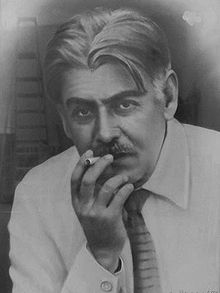Kote Marjanishvili

Konstantine "Kote" Marjanishvili (
theater director regarded as an important contributor to the pre- and post-revolutionary evolution of Georgian, Russian and Soviet stages.[1] One of the most prestigious and professional of Georgia’s directors, he was particularly famous for his lavish and massive theater shows.[2]
Early career
USSR
devoted to Kote Marjanishvili, 1972 (Michel 4048, Scott 4013)He was born to a well-to-do literary family of an army officer in Kvareli, eastern Georgia, then part of the Tiflis Governorate, Russian Empire. After acting and directing in his native country from 1893 to 1909, he went to Russia proper, Russifying his surname as Mardzhanov.
He worked for Russian provincial theaters as an actor, then as a director, until he established himself in the
Brothers Karamazov (1910) and the Craig Hamlet (1911).[3] Fascinated by Craig’s stylized manner of using puppets, Marjanishvili temporarily returned to Georgia to stage Oedipus Rex in a similar spirit. In 1913, he broke with Stanislavsky due to his left-wing sympathies and his interest in decadence, and organized the eclectic "Free Theater", where he staged opera, operetta, drama and pantomime. The enterprise, notable for its ties with the composer Sergei Rachmaninoff and the singer Feodor Chaliapin, and for its Georgian-type choreography, was rendered abortive in a year due largely to financial problems.[1] He then moved to Rostov-on-Don, where he directed the local theater from 1914 to 1915.[2]
Post-revolution years
Marjanishvili’s 1917 production of
Petrograd (St. Petersburg, Russia), and Tiflis (Tbilisi, Georgia). Marjanishvili’s simultaneous experiments with festive staging in Rostov-on-Don (1914-15) and Petrograd (1916-17) led him to coordinate the mass spectacle Toward a Worldwide Commune (co-directed by Nikolai Petrov, Sergei Radlov, Vladimir Solovyov and Adrian Piotrovsky, 1920). For years, he also worked in films (1916-28).[3]
Returning to the recently
Marjanishvili Theater after its founder (1933). The theater is still functional in Tbilisi and continues Marjanishvili’s eclectic and somewhat conformist traditions.[1]
In his later years, Marjanishvili worked at the Korsh Theater (Театр Корша) (1931-1932), the
Bolshevik doctrine, which won him awards at the Moscow Drama Olympiad of 1930. Yet, menacing charges against Marjanishvili soon began to appear in the Soviet press. He died of illness in Moscow on 17 April 1933 before the worsening political climate led to Joseph Stalin's Great Purge which would take the life of Marjanishvili’s erstwhile collaborator and rival Sandro Akhemeteli in 1937.[1]
Filmography
- Before the Hurricane, 1924
- Krazana, 1926
- Amok, 1927
Notes
- ^ ISBN 0-7007-1163-5.
- ^ a b Mikaberidze, Alexander (ed., 2007) Marjanishvili, Konstantine. Historical Dictionary of Georgia. Retrieved on November 1, 2017.
- ^ ISBN 0-521-44654-6.
External links
- Kote Mardjanishvili at IMDb in IMDb
References
- (in Russian) Шабалина, Татьяна (Shabalina, Tatiyana). "Марджанов, Константин Александрович." Энциклопедия Кругосвет (Entsiklopediya Krugosvet). Retrieved on May 7, 2007.
